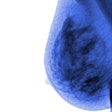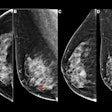A new study published in the Canadian Medical Association Journal found that 86% of women diagnosed with early-stage breast cancer undergo further imaging to assess whether the cancer has metastasized -- even though international guidelines recommend against this.
The American Society of Clinical Oncology, Cancer Care Ontario, and the National Comprehensive Cancer Network advise against imaging for metastatic cancer in asymptomatic women with stage I or II breast cancer, because the likelihood of metastases is low (0.2% and 1.2%, respectively) and the chance of false-positive findings is high, wrote lead author Dr. Mark Clemons, of the University of Ottawa, and colleagues.
The researchers conducted a study of 26,547 women in Ontario who were diagnosed with stage I or stage II breast cancer between 2007 and 2012. In all, 86% had at least one imaging test after diagnosis to determine whether the cancer had metastasized; the average number of tests performed per patient was 3.7 procedures pre- and postsurgery. Surgeons and oncologists ordered the most imaging follow-up, with surgeons ordering 74% of preoperative tests and oncologists ordering about 41% of postoperative tests (CMAJ, June 22, 2015).
In a commentary on the study, Dr. Daniel Rayson and Dr. Geoff Porter from Queen Elizabeth II Health Sciences Centre and Dalhousie University wrote that further testing after diagnosis can negatively affect patients.
"For most patients with newly diagnosed stage I and II breast cancer, reflexively ordering staging investigations does not help relieve stress, nor does it detect disease," Rayson and Porter wrote.



















